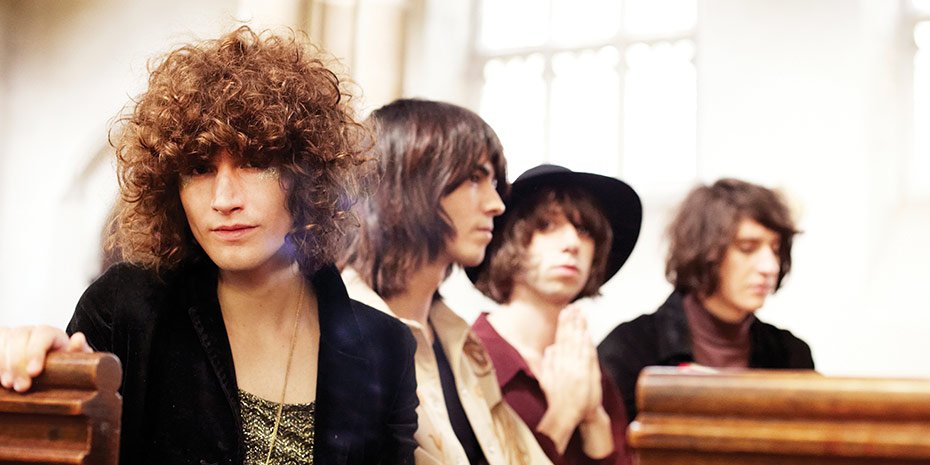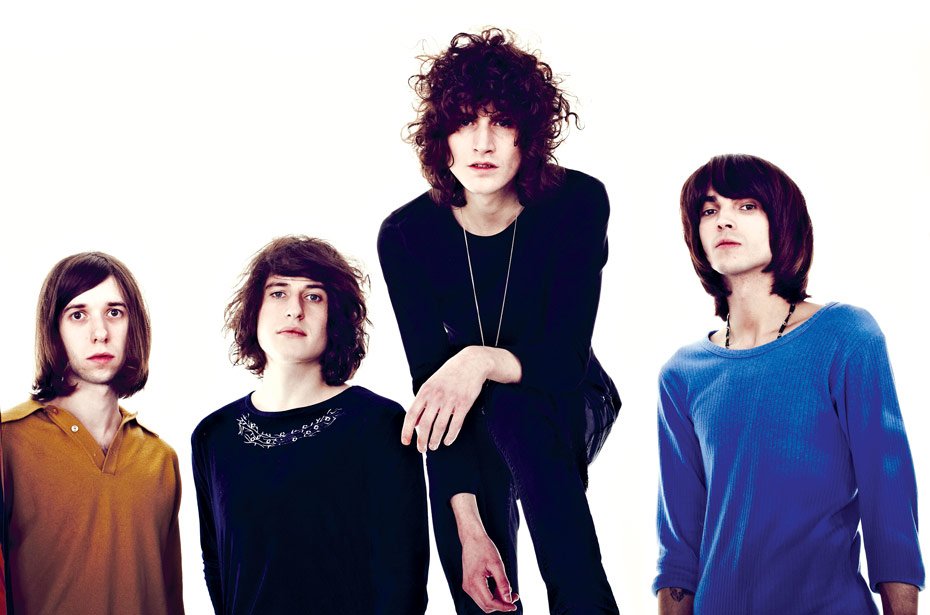An Interview with Temples


Out of the swirling vortex of the 1970s (or is it the 1070s?) and into the wide-eyed, confused middle of the 21st techno-century’s second decade comes an advocate for the psychedelic, hard hitting bombast of a more heroic age. Many bands these days seem to be found sitting in hallowed, murky castles, consulting the dark mirrors of hard rock’s early days. What spirits visit them one can only guess… but I’d say Geezer Butler, David Crosby, Jimmy Page, and David Gilmour all regularly fight over the soul of British up and comers Temples, never mind that none of those legends have actually died yet…
Temples has made a name for themselves amongst this new wave of psychedelia by consistently sticking to the genetics of that genre. This is a quality some critics decry as a weak point of the band, allowing a direct lineage from the past to be too easily perceived. Be that as it may, luckily for us their sonic identity never had time to lose everybody’s attention by trying to “find itself,” and we can get right to the immediate experience of an accomplished and honest band. Their penchant for the sounds of 60s and 70s acid rock may be obvious, but they are no jangly, 12-string guitared charlatans. Bassist/singer Thomas Walmsley and guitarist/singer James Bagshaw are the band’s songwriting backbone, and they’ve immersed themselves in the swirling mysticism and hallucinogenic geometry of British psychedelia. Their passion for archaic symbolism allows them to genuinely inhabit (at least lyrically) the landscape of buried crystals, crimson moons, odysseys, and lost destinies. Tis a strange landscape, as one would expect. But their artistry and talent resides not in the often-mysterious lyrics, but in the undeniably sexy ease of their pop-progressive melodies and aggressive rhythm section. These are not songs that have typical chord progressions, nor simple A-A-B-A song structures. Yet each part flows into the next with a smooth sensibility, providing an antidote to the jarring distortions, troubadour like treble notes, and tambourine flourishes. If you’re a fan of Unknown Mortal Orchestra, Tame Impala, or Dungen then you’ll appreciate the intentionally fuzzy and blasting recordings Temples has to offer. Check out title track “Sun Structures” for that familiar battle charge of drums, as well as album strong points “Move with the Season” and “The Golden Throne.”
The band formed when Walmsley and Bagshaw began writing songs for a home-recording project in their hometown of Kettering, England. After posting some of the self-produced songs to YouTube they snagged the attention of Jeff Barrett, the founder of indie-rock label Heavenly Recordings. Barrett released their first single “Shelter Song,” a tune that hovers halfway between the guitar riff on The Beatles’ “Day Tripper” and the singing style of 60s folk icon Donovan. They then enlisted two other local musicians, Samuel Lloyd Toms (drums) and Adam Smith (keyboards/guitar) to help them play the recorded songs live, something they’d never done before. The tightness of their live act quickly earned them slots onstage at major UK festivals where they shared lineups with big time British bands Kasabian, Suede, and The Vaccines. After announcing their first headlining UK tour in late 2013, they released their debut album Sun Structures early last year, and have since played on The Tonight Show Starring Jimmy Fallon, The Ellen Degeneres Show, and shared a bill with The Rolling Stones. Yes, it’s been a rather quick jog up the mountainside of public opinion for these four lads, demonstrating that although clearly they’ve dipped into that acid-dosed punch wizards sometimes serve at occult geometry parties, their marketing wit hasn’t lost any savvy.
ELEVEN: Alot of media interest has been given to Noel Gallagher’s (frontman of Oasis) ringing endorsement of you guys as Britain’s best new band. What has that compliment done for you in terms of opening doors, and has it put more pressure on the band?
Adam Smith: He said that about 2 years ago, so it’s sort of less relevant now, it was definitely great to hear that Noel Gallagher was backing us, but I don’t know if it necessarily opened many doors. It might’ve helped us a little bit, and we were pleasantly surprised, but I can’t really remember actually. I guess he came to see us play a show in London, and it was good to meet him, he was quite funny. And we just sort of got really drunk with him, and that was probably the best part of it… hah..
11: The band’s connection to 60s and 70s psychedelic rock influences is evident, but what would you say your favorite contemporary artists and influences are?
AS: Umm yeah, we certainly do. Recently I’ve been listening to Conspiracy Of Owls, and there’s a guy called John Krautner, I think he was in the band The Go, from Detroit you know I think ten years ago or so. I don’t actually listen to that much modern stuff. Sam, the drummer, listens to a lot of new music though.
11: What would you say are some of your most important influences from the classic psychedelic period of the 60s and 70s?
AS: Probably just the obvious ones, you know, Pink Floyd, and The Beatles, of course you can’t ignore The Beatles. And then some more proggy stuff, Van der Graaf Generator, and Slapp Happy. Slapp Happy is from England, more of an art-rock band really, they never really get out and tour, I think that might be a problem for them, but they’re great yeah.
11: You guys have gained a considerable measure of attention in a short time. I mean going from forming the band in 2012, to playing on the same bill as the Rolling Stones less than three years later. How has that rapid rise affected the band’s identity, as well as your personal identities?
AS: Well it’s definitely been stressful at times, but I don’t think the success has really gone to our heads at all. If it has gone to our heads, it’s in that way which that stress might get to you. You know sometimes we go through periods, separately, of infighting, but I think that’s true for anyone in any job or avenue of life. It’s difficult to speak for everybody, I’m only one person in the band, but yeah it has been quick and it has been quite overwhelming at times. But it’s been great, and we’ve been very fortunate. Counting our lucky stars, you know, or what have you.
11: What was the music scene like growing up in Kettering, England? Are there other bands there we should know about?
AS: Ah it wasn’t much of anything really, it’s a very small town with kind of a shit music scene. But it was good for us I suppose, and yeah there’s some other good bands, but it’s all very small.

11: Any great old psyche/prog records people should be aware of that might have influenced the band?
AS: Slapp Happy, like I’d mentioned before was a really great band, and there was another one… I’m trying to think… Yeah it was this weird jazzy prog album by a guy named John Greaves, I think from the mid-70s. It was called Kew Rhone and was kinda like a song cycle. It had all these amazing palindromes and literary anagrams within the lyrics. Those were written by Peter Blevgad I’m pretty sure. Great album, but pretty forgotten. Kinda like jazz fusion.
11: What role does psychedelic literature and visual art play in the band’s creative output? Do you guys have particular authors that influence you?
AS: Not particularly, actually. I’m not really interested in psychedelic literature. I can’t speak for the other guys I suppose, but there are some interesting algorithms that can be fun to play around with. The N+7 algorithm is an interesting one… you basically take a noun in any given sentence and replace it with the seventh noun following it in the dictionary. Kind of an interesting way to spontaneously generate fresh lyrics and mix things up.
11: This magazine is based out of Portland OR, have you guys ever played here or been to the West Coast?
AS: Yeah we’ve been there before. We love Portland. And we’ve played there twice before already… I think first at the Star Theater, and then I think it was the Hawthorne Theater. Yeah, awesome city, very excited to be going back.
11: We tend to have a reputation for craft breweries and record stores. Are you guys planning on checking out any of those stores when you’re in town?
AS: Well I’m not sure really… I don’t have any plans to visit record stores necessarily. I actually don’t have much of a record collection, I really only have CDs actually… haha… but I think the other guys might check it out, they’re more into the vinyl. I was really stoked on the clothing and shoe stores to be honest. You can find some really great shoes in Portland, shoes with strong soles and heels you know. We were up somewhere I think on Hawthorne last time we were there, and they had this store with nice shoes, and I didn’t want Matt to buy the same shoes and copy me so I went into the store and hid all the shoes of that kind. It was rather ridiculous.
11: So you guys play the Crystal Ballroom on May 22 with Father John Misty. He’s quite a favorite in the Pacific Northwest, and a lot of America I suppose. What do you guys think of him?
AS: I honestly don’t really know much about him. Haven’t really listened to him much, but I’ve heard, like you said, that he’s real good. And we are definitely stoked to play with him, and to just play at the Crystal Ballroom. »
– Ethan Martin



